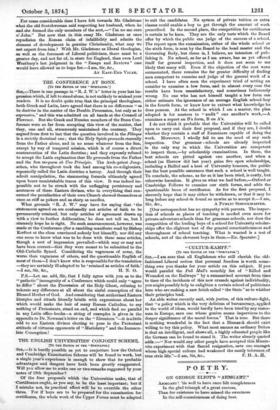'11u ENGLISH UNIVERSITIES' CONJOINT SCHEMg.
[TO THB EDITOR OF THE "SPECTATOR.]
SIR,—It is hardly possible as yet to conjecture how the Oxford and Cambridge Examination Scheme will be found to work, but a single year's experience is enough to show that its probable advantages and dangers have both been greatly exaggerated. Will you allow me to make one or two remarks suggested by your -notes of 19th September? Of the four proposals which the Universities make, that of Certificates ought, as you say, to be the least important; but if I mistake not, its practical effect will be to override the other -three. For if boys are to be prepared for the examination for 'certificates, the whole work of the Upper Forms must be adapted
to suit the candidates. No system of private tuition or extra classes could enable a boy to get through the amount of work prescribed. In the second place, the competition for certificates is certain to be keen. They are the only tests which the Board offer by which the public can judge of the success of a school. The report upon the examination, either of the whole school or the sixth form, is sent by the Board to the head master and the Governing Body, but there is, I believe, no intention of pub- lishing it. No school, as far as I am aware, has as yet offered itself for general inspection, and it does not seem to me likely that many will. Even if the objection of the cost were surmounted, there remains the far greater difficulty of finding men competent to examine and judge of the general work of a schooL I have often seen the experiment tried of setting an outsider to examine a low form, and in almost every, case the results have been unsatisfactory, and sometimes ludicrously wrong. No one who has not himself taught a low form can either estimate the ignorance of an average English school-boy in the fourth form, or know how to extract what knowledge he does possess. At the school in which I am a master, the plan adopted is for masters to " audit" one another's work,—A examines a report on B's form, B on A's.
I do not think it probable that the Universities will be called upon to carry out their first proposal, and if they are, I doubt whether they contain a staff of Examiners capable of doing the work. Moreover, I wholly fail to see the need of any such inspection. Our grammar - schools are already inspected in the only way in which the Universities are competent to inspect them,—by scholarship examinations. In these, the best schools are pitted against one another, and when a school (as Harrow did last year) gains five open scholarships, including a Balliol and a host of University honours, the public has the best possible assurance that such a school is well taught. To conclude, the scheme, as far as it has been tried, is costly, but otherwise harmless. It gives us what wer had .before,—Oxford or Cambridge Fellows to examine our sixth forms, and adds the questionable boon of certificates. As for the first proposal, I sincerely hope that it may either be withdrawn, or that it may bo long before any school:is found so unwise as to accept it.—I am, [Our correspondent has no sympathy with parents. The inspec- tion of schools as places of teaching is needed, even more for private-adventure schools than for grammar-schools, nor does the competition of the leading boys of a school for University scholar- ships offer the slightest test of the general conscientiousness and thoroughness of school teaching. What is wanted is a test of schools, not of the cleverest boys in them.—En. Spectator.]


































 Previous page
Previous page